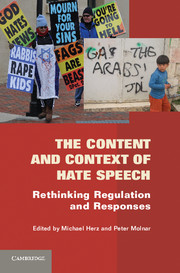Book contents
- Frontmatter
- Contents
- Contributors
- Foreword: Hate Speech and the Coming Death of the International Standard before It Was Born (Complaints of a Watchdog)
- Foreword: Hate Speech and Common Sense
- Acknowledgments
- Introduction
- Part I Overviews
- Part II Refinements and Distinctions
- Part III Equality and Fear
- 16 Hate Speech and Political Legitimacy
- 17 Reply to Jeremy Waldron
- 18 Waldron, Machiavelli, and Hate Speech
- 19 Shielding Marginalized Groups from Verbal Assaults Without Abusing Hate Speech Laws
- 20 Interview with Nadine Strossen
- 21 Interview with Theodore Shaw
- Part IV International Law
- Index
- References
16 - Hate Speech and Political Legitimacy
Published online by Cambridge University Press: 05 June 2012
- Frontmatter
- Contents
- Contributors
- Foreword: Hate Speech and the Coming Death of the International Standard before It Was Born (Complaints of a Watchdog)
- Foreword: Hate Speech and Common Sense
- Acknowledgments
- Introduction
- Part I Overviews
- Part II Refinements and Distinctions
- Part III Equality and Fear
- 16 Hate Speech and Political Legitimacy
- 17 Reply to Jeremy Waldron
- 18 Waldron, Machiavelli, and Hate Speech
- 19 Shielding Marginalized Groups from Verbal Assaults Without Abusing Hate Speech Laws
- 20 Interview with Nadine Strossen
- 21 Interview with Theodore Shaw
- Part IV International Law
- Index
- References
Summary
Proposals to ban hate speech are sometimes met with the objection that the restrictions on free speech that they envisage will undermine the legitimacy of the political system that imposes them. I have defended the idea of such restrictions elsewhere, and in this chapter I consider whether this worry about legitimacy constitutes a serious objection.
There are a number of arguments in the literature that link the protection of free expression to the flourishing of self-government in a democracy. Some say little more than that, though they say it sonorously and at great length. In a few of these arguments, however, the position is advanced beyond a general concern for the democratic process. It is sometimes said that a free and unrestricted public discourse is a sine qua non for political legitimacy in a democracy. Robert Post makes this argument. Some sharpen the point yet further, arguing that the political legitimacy of certain specific legal provisions and institutional arrangements may be imperiled by the enactment and enforcement of hate speech laws.
DWORKIN ON LEGITIMACY
The most powerful argument of this kind is presented by Ronald Dworkin, in a “Foreword” he contributed to a large, recent, and valuable volume entitled Extreme Speech and Democracy, edited by James Weinstein and Ivan Hare. According to Professor Dworkin, freedom for hate speech or group defamation is the price we pay for enforcing the laws that the haters and defamers oppose (for example, laws forbidding discrimination). Here is how the argument goes.
- Type
- Chapter
- Information
- The Content and Context of Hate SpeechRethinking Regulation and Responses, pp. 329 - 340Publisher: Cambridge University PressPrint publication year: 2012
References
- 5
- Cited by

